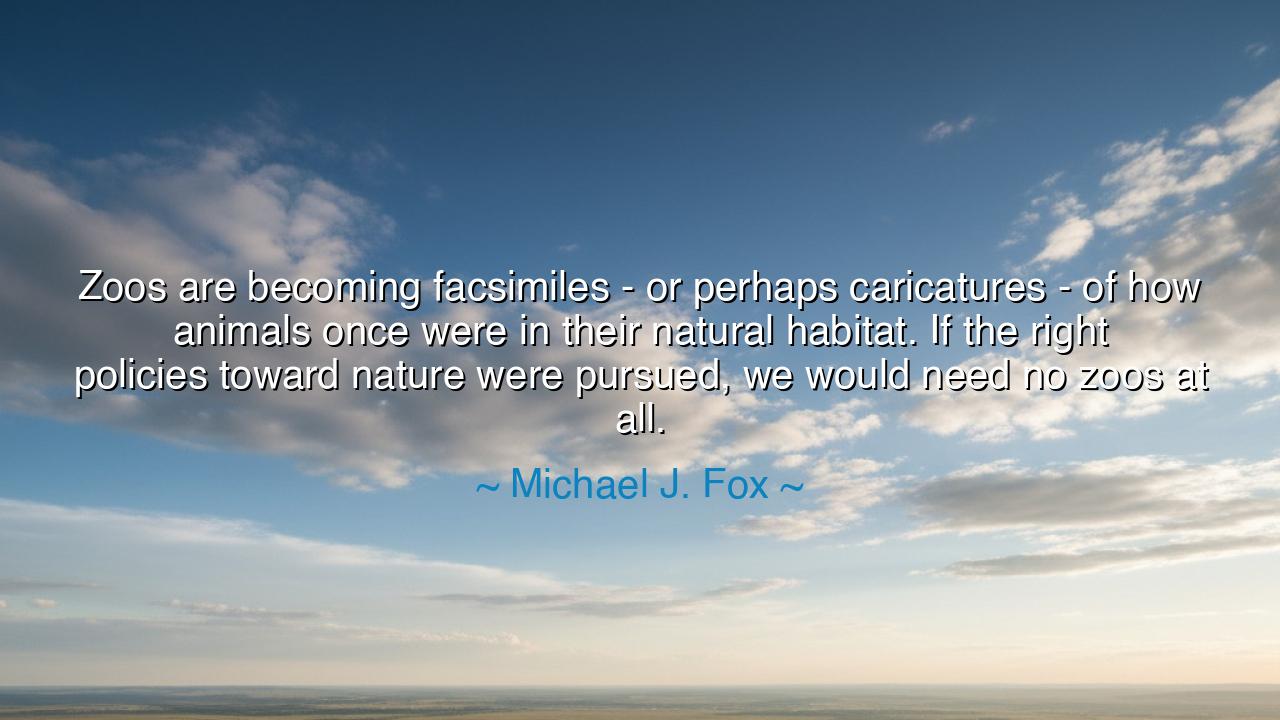
Zoos are becoming facsimiles - or perhaps caricatures - of how
Zoos are becoming facsimiles - or perhaps caricatures - of how animals once were in their natural habitat. If the right policies toward nature were pursued, we would need no zoos at all.






“Zoos are becoming facsimiles—or perhaps caricatures—of how animals once were in their natural habitat. If the right policies toward nature were pursued, we would need no zoos at all.” Thus spoke Michael J. Fox, not in jest nor passing remark, but in lament over the fate of wildness and the choices of humankind. His words strike like a bell, reminding us of a sorrowful truth: that what we see behind iron bars and glass walls is but a shadow of the great nature once untamed, once free, once whole.
The meaning of his saying lies in the contrast between reality and imitation. A zoo, no matter how carefully constructed, is a pale image of the wild. To look upon a lion pacing in its enclosure is not to see the king of beasts ruling over a savanna, but a broken echo of majesty. To see an elephant in chains is not to witness the grandeur of the herd roaming the endless plains, but to watch memory made into parody. The caricature wounds us, because it whispers of what once was and of what has been lost.
Fox’s words point also to the root cause: our failure to live with wisdom toward the earth. Were we to pursue the right policies toward nature—policies that preserve forests, rivers, seas, and skies, that guard the balance of ecosystems and respect the dignity of every creature—there would be no need for cages. The wild would remain wild, and humankind could walk beside creation as steward, not captor. The existence of zoos is a mark not of triumph, but of failure: proof that we could not preserve enough of the earth for her children to thrive.
History bears witness to this sorrow. Consider the fate of the passenger pigeon, once darkening the skies of North America in flocks so vast they took hours to pass overhead. Hunted without restraint, they vanished into extinction within a single human lifetime. Today, we may see their stuffed remains in museums, sad reminders of a majesty that lives no more. Or recall the Tasmanian tiger, the thylacine, driven to extinction by human hands. A film reel from a zoo remains, showing the creature pacing endlessly, a ghost in motion, the last of its kind. These images are not triumphs of preservation—they are caricatures of life destroyed.
The origin of this wisdom springs from the growing realization, voiced by naturalists, scientists, and artists alike, that the fate of animals and ecosystems is bound to our own. Michael J. Fox, by invoking zoos, speaks not against the caretakers who labor there, but against the system that made them necessary. His words are not only critique, but call: a call to reimagine our relationship with nature itself, to restore the wild places so that no creature need live in imitation of freedom.
There is a heroic challenge hidden here. It is easy to pity the caged animal; harder to change the habits and industries that demand such cages exist. Yet the duty falls upon each of us. To live with respect for the earth, to demand leaders preserve the wilderness, to support efforts that defend the rainforests, oceans, and grasslands—these are the actions that ensure future generations will know animals not as parodies in cages, but as sovereign beings in their kingdoms of sky, land, and sea.
Therefore, dear listener, take Fox’s words as both mourning and mandate. Do not be content with facsimiles of life, but work for the reality of freedom. Support conservation, reduce waste, protect habitats, and teach your children reverence for the living world. For only when the forests are preserved and the rivers kept pure will zoos be no longer needed. Then, humankind will at last return to its rightful role—not as jailer, but as guardian of creation. And in that day, the lion shall stride the savanna, the eagle shall soar the mountains, and all creatures shall once more be seen in the splendor of their natural habitat, unbound, eternal.






AAdministratorAdministrator
Welcome, honored guests. Please leave a comment, we will respond soon